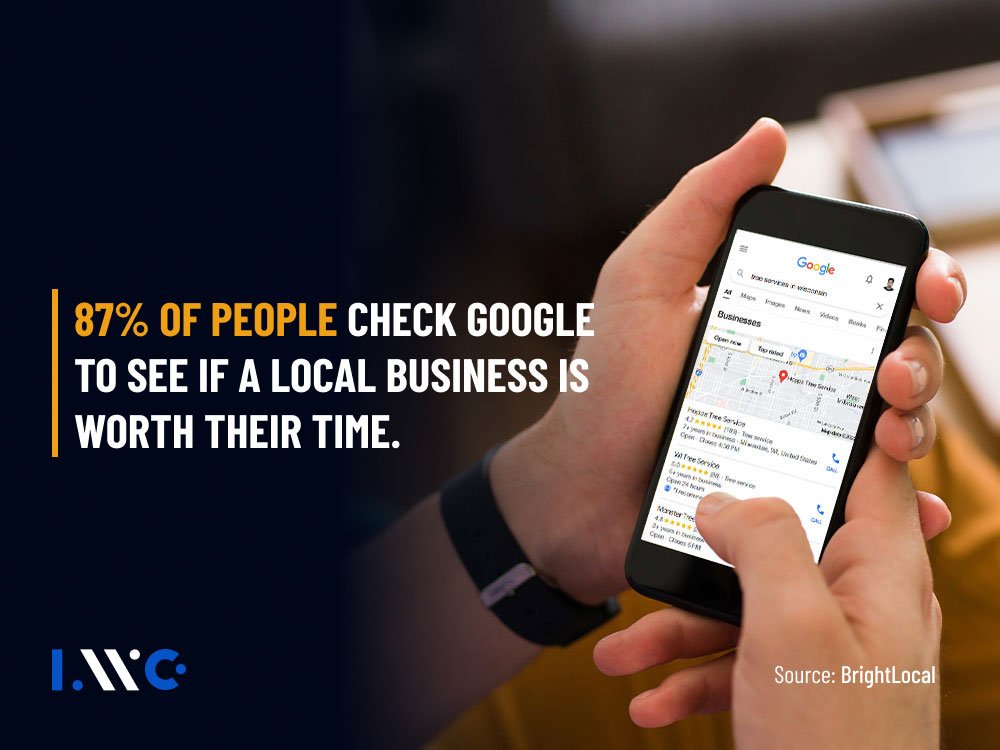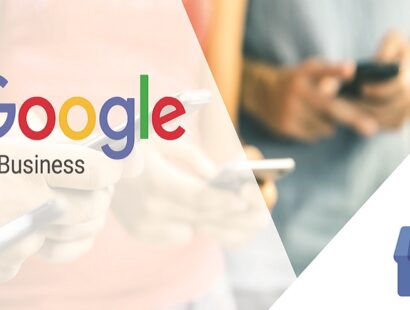You are on the hunt for valuable local clientele and are wondering if you need local SEO.
The short answer is yes. Local SEO is critical for small businesses to thrive in the modern world. Here, we’ll dive into the why and explain how to use this strategy to your advantage.
Many people in the United States (at least 87% of consumers, according to a 2023 survey by BrightLocal) check Google before patronizing a local business or service.

What this means: To thrive as a small business catering to a certain geographical area, you need a trustworthy local presence on search engines like Google. How do you achieve this?
One guess: local SEO (search engine optimisation)
Table of Contents
- What exactly is local SEO?
- Why does my business need local SEO?
- 5 benefits of local SEO
- What businesses need local SEO?
- How is local SEO different from traditional SEO?
- How does local SEO work?
So, what exactly is local SEO?
Local search engine optimization is the practice of making your business visible in search results that are specific to your area.
So, let’s say you own an auto-repair shop in Milwaukee, and you’ve optimized local SEO for this business. When people in Milwaukee search for, say, “auto mechanic near me,” your business will appear among the search results.
There are different ways a local business can appear in Google’s search results. These include:
- Google Map Pack
- Organic Results
- Paid Search Results
- Videos
Google Map Pack

This is where most people find local businesses online. The Google Map Pack showcases the most relevant businesses/services within a region to searchers within that region. Here, searchers can find key details about your business, i.e:
- your address
- phone number
- opening hours
- website
- pictures of your products/service/brick-and-mortar store
- most importantly, your reviews and ratings.
We say “most importantly” because reviews are what most people look out for. According to the same survey from BrightLocal, at least 98% of consumers read online reviews when checking out local businesses.
To appear in Google’s Map Pack, you need to set up a Google Business Profile (GBP). Doing this and appearing in the pack is only the first step. For more chances of success, you want to be among the most relevant businesses, i.e., the first three results.

Ranking in the top 3 is a whole different ballgame. You can read our guide on how to set up and optimize your Google Business Profile to rank highly.
Organic Results
These are the “normal” results that appear for most search queries.
It’s typically a page title linking to your website and a snippet of text (usually a meta-description) below.

To rank highly in organic search results, you need to have a website. And then develop a local SEO strategy to make the website rank highly for certain geographical search terms.
Paid Search Results
For certain searches, you will notice that the results at the top of the page each have the word “Sponsored” above them, like this:

Those are paid search ads. Businesses pay Google to have their website rank higher than organic search results for certain search terms.
These ads usually follow a mode of advertising called PPC, or pay-per-click. This means you only get charged when someone clicks on your ad and enters your website.
It sounds like a good deal, but sometimes it gets a little more complicated than that. Often, you’ll have to bid to rank high for certain keywords
Videos
Videos from a local business website, social media account, or YouTube channel can also rank for certain search terms. For instance, if a searcher wants to learn how to fix a tire and you’ve uploaded a video that explains how this is done, your video could show up in the search results.

Ranking with “how-to” videos positions your business as a trusted subject matter expert within your field. Ideally, this will increase brand awareness and attract the right leads.
With enough tact, these “how-to” videos can also serve as promotional material, leading people to inquire about your services.
Why does my business need local SEO?
We work with a lot of contractors and local businesses, so we get it—you’re extremely busy. Your time and energy are precious resources. What, then, would justify diverting these already scarce resources to local SEO?
The reason is simple: your local buyers have gone digital.
The stats back this up:
BrightLocal’s survey revealed that 98% of consumers used the internet to find information about local businesses. ‘
According to another report from Think With Google in 2018, 78% of holiday shoppers searched online before going to a store.
Local SEO is crucial if you want people in your area to discover and trust your business.
5 benefits of local SEO
But there are a few more reasons you will want to consider taking this route:
It’s quite cost-effective
Local SEO is a relatively cheap form of advertising for local businesses. If you could learn how to do it properly yourself, you wouldn’t be paying for much except some premium software and maybe Google Ads (paid search ads).
However, it does require time, energy, and skill to generate significant results, which is why many businesses delegate to local SEO agencies.
The returns (leads, sales) generated from local SEO campaigns often far outweigh the investment. This puts it ahead of traditional advertising channels like banners and local TV ads in terms of return on investment (ROI).
Generates more sales and conversions
Local SEO is becoming more competitive, but with the right strategy, you can still acquire more customers than you normally would.
To give an example; within our first few months of handling Speedy Dumps’ (a dumpster rental service) strategy, we generated 160% more conversions and had 140% more leads calling than usual. (Read the full case study to see how it was done.)
As a brick-and-mortar business, local SEO increases your chances of capturing in-store foot traffic. A survey by Reviewtrackers found that 42% of millennials will likely visit a business after discovering it via a local search.
Can target higher-quality clientele and high-end locales
Quantity is not the only game here. Some small businesses prefer to work in certain locations or target a certain caliber of clientele. With local SEO, you can attract customers from preferred locations that are close to your business, even if you aren’t physically based in said locations.
You’ll just have to increase your online visibility and search rankings in those areas. Like we did with Pewaukee Drywall (a drywall & painting service). With our strategy, the business ranked highly in nine different nearby cities, about four of which contained their most preferred clientele. The result? More high-value business. (Full case study.)
Positions you as a trusted authority
Content marketing could be a big part of your local SEO strategy. It involves releasing informational content (articles, videos, social media posts, and even webinars) about topics relevant to your business, area, or industry.
Consumers are a curious bunch. And the more you post the information they need, the more they trust you. With this trust, you can gain an edge over competitors and attract loyal customers.
Provides a competitive edge
Businesses with local SEO have a lot more to gain than businesses that don’t—more calls, more subscriptions, and more in-store foot traffic. They can simply reach more people.
Also, reviews are very important these days—87% of buyers won’t even consider a business with an average rating below 3 stars. This means businesses with better online reviews have the upper hand.
Another competitive advantage is that you can keep track of what your online competitors are doing right or wrong—by checking their reviews, for instance, to see what their customers are saying. Information like this can be used to improve your business.
What businesses need local SEO?
To put it broadly, any type of business that has a physical location or caters to a geographic area (typically a state, county, city, or village). Such businesses include:
- Lawyers: potential clients can call via the “Call us” button on the Map Pack for consultations or to hire their services.
- Restaurants: customers can check out menus via pictures on the Business Profile, and order food for delivery, takeout, or dine-ins. They can also make table reservations.
- Medical services: people can set up appointments or find directions to the doctors nearest to them.
- Contractors/Handymen (plumbers, roofers, electrical services, etc.): many people in need of contractors will check their reviews to see how good they are before setting up a call.
- Real estate agencies: having a visible website and great reviews as a real estate agent will drive in more deals that you can close. One great tip is to rank with awesome videos of your locale and for-sale commercial properties.
- Local stores: nearby customers can visit your website to check your product catalog and prices. Some will also check your reviews and your store’s appearance on the Map Pack before ordering an item or stopping by.
There’s a vast range of services that people want to find online: mechanics, tree services, concrete installers, dumpster rentals, interior decorators, and even gas stations. It’s a long list.
Businesses that don’t really need local SEO services include e-commerce stores, digital agencies that aren’t restricted to a geographical area, and online sellers that want their information private. Such businesses use traditional SEO instead.
How is local SEO different from traditional SEO?
There’s a much more common type of SEO that is not geographically bound: traditional SEO. This type of SEO is concerned with search results on a national and global scale.
Searches like “digital marketing tips” and “how to do pull-ups” are not location oriented, so if your site were to rank highly for searches like that, you would be doing traditional SEO, or just SEO, as most people call it.
In a nutshell, local SEO differs from traditional SEO in that it focuses on searches that are relevant to a geographical area (usually a city, town, or state).
In many ways, both follow the same strategies and principles. But in trying to rank for searches with local intent, local SEO uses a few different techniques.
How does local SEO work?
Perhaps the most crucial element of local SEO is having a Google Business Profile. Why? Because the results that appear in the Google Map Pack are usually the most important thing to local searchers (remember, you need a GBP to appear in the Map Pack).
You don’t need to have a website to create a GBP or appear in the Map Pack results. What really matters is that your contact information, address, and opening hours are accurately represented.
This means if you already have your business information showing up in other places (directories, social media, etc.), it has to match your Google listing. Google might even randomly ask people who live in your area or have visited your store to confirm some details about your business.
Apart from using accurate information, you are required to follow a set of “guidelines for representing your business on Google.”
All that said, there’s more that goes into creating a successful local SEO strategy that drives significant results. This includes:
- Creating a user-friendly website
- Optimizing the website to rank for local search terms/keywords.
- Doing local content marketing.
- Optimizing for mobile local search.
- Doing a local SEO audit (if you already have an existing strategy and website).
- Optimizing your Google Business Profile (with great reviews, Google posts, and accurate information).
- Optimizing your online directories and citations.
- Executing/improving your on-page SEO (internal linking, title tags, meta descriptions, URL, etc.)
- Acquiring relevant backlinks to your website.
- Using social media.
We cover all of this, as well as how Google determines local search rankings, in our comprehensive guide on how to create a successful local SEO strategy.





